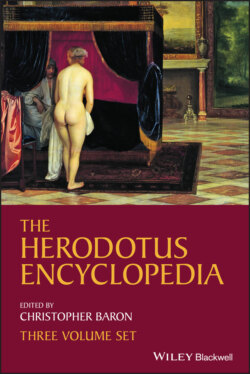Читать книгу The Herodotus Encyclopedia - Группа авторов - Страница 993
BLACK SEA, see EUXINE SEA BLAME
ОглавлениеHELMUT G. LOEFFLER
City University of New York–Queensborough
Herodotus begins the Histories with a PROLOGUE (1.1–5) that functions both as an introduction of the general theme and of the method he uses (Immerwahr 2013, 163–66). He writes that, among other tasks, he wants to show who or what is to blame for the beginning of the conflict between Greeks and BARBARIANS. The word Herodotus uses to indicate responsibility—aitiē—has a range of meanings that include “blame,” implying also guilt (Powell 1960 s.v. αἰτίη). In most cases Herodotus uses aitiē in the context of action to which blame is assigned (Immerwahr 2013, 160). Thus CAUSATION is important in the Histories from the start. Herodotus, for example, declares (1.5.3) that he himself knows of the man who started the unjust deeds against the Greeks (CROESUS) and that he is going to identify him as part of his inquiries. Herodotus throughout the Histories not only links events with each other by emphasizing cause and effect and the assignment of blame, but also employs a large variety of motives to explain human behavior (see Froehlich 2013). Thus the inquiry into the responsibility and blame for the beginning of the conflict, and for events in general, moves the narrative along.
In this connection Herodotus frequently identifies metaphysical factors. DREAMS, ORACLES, and signs, for example, influence the outcome of events. For modern readers the supernatural in the Histories provides probably the greatest challenge, since it is difficult if not impossible for us to understand the deep influence of religion in early classical Greece (Mikalson 2003, 194). For example, Herodotus not only assigns blame to XERXES for his decision to invade Greece—the most important decision portrayed in the Histories—but also finds some responsibility in divine preordination (dreams in this case). However, in most cases responsibility and blame for decisions and their outcomes can be found in the Histories by looking at the actions of the protagonists. They are often influenced by the desire for VENGEANCE, profit, or an expansion of their power. While the supernatural usually anticipates, supports, and validates the tendencies and predilections of individuals, Herodotus generally does not assign blame to the metaphysical as the single cause for events.
SEE ALSO: Decision‐making; Historical Method; historiē; Motivation; Religion, Greek; Symbols and Signs
